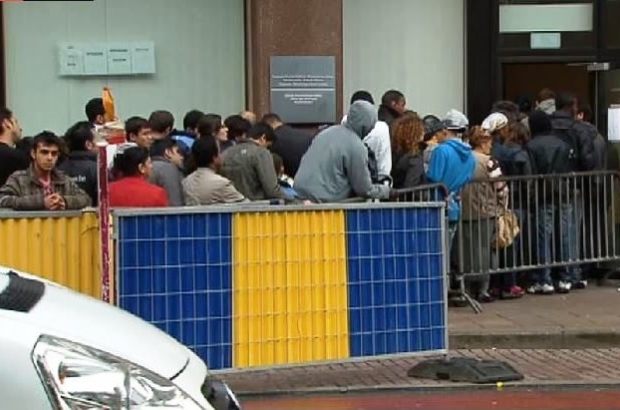- Daily & Weekly newsletters
- Buy & download The Bulletin
- Comment on our articles
Asylum crisis: Tents pop up as NGOs seek to fill gaps in government response
As the number of refugees flocking to Belgium continues to overwhelm the government support structures in place to process them, NGOs are stepping up their aid in addition to their demands for solutions.
Humanitarian organisations the Brussels Refugee Council, Médecins du Monde, Plateforme Citoyenne, Médecins Sans Frontières, Samusocial and Ciré all helped set up approximately 25 cardboard tents and distributed sleeping bags and blankets to unaccompanied minors this week.
“This is not sustainable, but we have no other alternatives,” said Michel Genet, director of Médecins du Monde.
Police removed the tents on the orders of Brussels mayor Philippe Close on Wednesday morning, but the organisations have since replaced them.
“We understand Mayor Close's concern, but we hope that the tents will still not be taken down by the police. To ensure this, the staff and volunteers of the organisations concerned will remain on site.”
The federal government met on Thursday in hopes of finding solutions for the refugee crisis, but the humanitarian organisations said the meeting did not result in a suitable outcome.
“No solution has been found with immediate effect and the long-term solutions proposed are vague,” said Soti Ngo of Ciré.
The meeting included state secretary for asylum and migration Nicole de Moor (CD&V), and various reports from government sources following its conclusion insisted that plans are still being made.
But in the meantime, refugees are – and have been for months now – lining up on the streets of Brussels outside the overwhelmed reception centre, often sleeping there at night to avoid losing their spot in an ever-growing line of asylum-seekers.
The federal government agreed to assign 150 extra staff members to reception places, including employees from other government departments. They also agreed to collaborate with other agencies in hopes of securing more staff.
There is also talk of speeding up the processing of asylum applications for unaccompanied minors, who aid organisations are especially concerned about.
“There are four young people who were picked up by a taxi and taken to [a nearby shelter], but towards the end of the evening, four new unaccompanied minors arrived,” one volunteer told Bruzz.
“Not every unaccompanied minor is receiving shelter.”
Aid workers are concerned that unaccompanied minors are especially vulnerable to becoming victims of human trafficking and other types of crime.
While the refugee crisis in Belgium has been going on for some time now, in the past it was only single men who ended up sleeping on the streets at night, as unaccompanied minors and families were given priority processing.
But as the system continues to be overwhelmed with new arrivals, many as a result of the US withdrawal from Afghanistan and the war in Ukraine, the situation for the most vulnerable asylum seekers is becoming more dire.
Employees of the federal reception service for asylum seekers have long been warning that the crisis would reach new proportions, and staff at the Petit Château reception centre in Brussels held an hour-long strike on Thursday afternoon to highlight the “inhumane consequences” of the crisis.
















